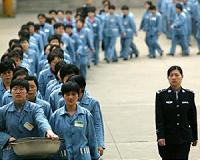 |
Shanghai (AFP) Jan 25, 2011 Shanghai students may have topped a recent global survey but educators in China are not rejoicing, saying the country has a long way to go before rote learning and test-taking turn into innovation. The 500 Shanghai students who participated in the Organisation for Economic Cooperation and Development (OECD) study released last month outperformed the rest of the world in reading, science and mathematics. It was the first time mainland Chinese students had taken part in the Programme for International Student Assessment, or PISA -- a study carried out every three years that benchmarks 470,000 15-year-old pupils in 65 countries. But while the OECD results sparked alarm overseas as further evidence of China gaining on the rest of the world, Chinese educators are hardly triumphal and say different skills are needed to compete in a global knowledge economy. "Since China opened up to the world, we found children in foreign countries were relatively more creative and better at solving problems in real life," said Ding Yi, vice-principal at Shanghai's Jing'an Education College Affiliated School. "We're constantly thinking about this problem," said Ding, whose students took the PISA test. In the United States and Europe, the findings triggered fears of falling behind China. US Secretary of Education Arne Duncan called it a "wake-up call". Chester Finn, who served in former US president Ronald Reagan's Department of Education, likened China's scores to "Sputnik" -- the Soviet satellite launched in 1957 that startled America into action in the space race. But Yong Zhao, the University of Oregon's associate dean for global education, drew a simpler conclusion. "When you spend all your time preparing for tests, and when students are selected based on their test-taking abilities, you get outstanding test scores," Yong wrote on his blog. The two-hour PISA features a mix of multiple-choice and open-answer questions based on written passages describing real-life situations. A sample math question asks students which pizza is better value: one that is 30 centimetres in diameter and costs 30 "zeds" or a 40-cm pizza costing 40 "zeds." Students must show their reasoning. In China, where national achievements are typically trumpeted loudly, the PISA rankings barely made a ripple. Ding said they showed merely that the country's education reforms and investments to improve schools were bearing fruit. China has said its spending on education has been rising steadily from a World Bank estimate of 2.9 percent of gross domestic product in 2001 to four percent for 2012. Ding said that over the past decade, her school's curriculum had evolved to move beyond traditional basic subjects like math, Chinese, and science to classes such as creative writing, building robots and designing web pages. More emphasis was put on independent research projects as well, she said. She added that in China, the only tests that truly matter are the fiercely competitive high school and college entrance exams that serve as gateways to the best schools and opportunities. But even those are being questioned. A study of more than 1,000 top scorers from 1977 to 2008 showed none stood out as successes in academia, business or politics, the state-run China Daily reported after last June's college test. The paucity of China-reared Nobel prize winners in science despite its huge population of more than 1.3 billion people is also a source of hand-wringing. "We are really concerned about the situation here and want to see real improvement," said Tao Hongkai, who heads an education research institute at Huazhong Normal University in the central city of Wuhan. "We won't be complacent about this superficial data." Schools in Shanghai, China's gleaming commercial hub, also are not considered representative of those in the country as a whole. Vast, poor, inland regions are far less well-funded and struggle to attract good teachers. By contrast, the Jing'an school features a robotics lab, a new media lab with 40 new Apple computers and a geography room with 3-D maps and a weather station. These facilities signal a shift away from rote learning, Ding said. "Not every problem can be solved on a test paper," she said.
Share This Article With Planet Earth
Related Links China News from SinoDaily.com
 West guilty of 'cowardice' on China rights: HRW
West guilty of 'cowardice' on China rights: HRWBeijing (AFP) Jan 24, 2011 Human Rights Watch on Monday accused Western governments of a "near-universal cowardice" in dealing with China, arguing they preferred opaque talks to taking a vocal stand against enduring repression. In its World Report 2011, the US group said while the United States, the European Union, Australia and others had dedicated forums to discuss human rights concerns, those meetings were proving ... read more |
|
| The content herein, unless otherwise known to be public domain, are Copyright 1995-2010 - SpaceDaily. AFP and UPI Wire Stories are copyright Agence France-Presse and United Press International. ESA Portal Reports are copyright European Space Agency. All NASA sourced material is public domain. Additional copyrights may apply in whole or part to other bona fide parties. Advertising does not imply endorsement,agreement or approval of any opinions, statements or information provided by SpaceDaily on any Web page published or hosted by SpaceDaily. Privacy Statement |